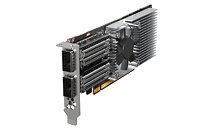Wednesday, June 16th 2021

QNAP Launches Dual-port 100GbE Network Expansion Card
QNAP Systems, Inc., a leading computing, networking and storage solution innovator, launched its first dual-port 100 GbE network expansion card - the QXG-100G2SF-E810. Featuring an Intel Ethernet Controller E810 and PCIe 4.0, the QXG-100G2SF-E810 provides up to 100 Gbps bandwidth for QNAP NAS or Windows /Linux devices to attain optimal performance in a wide range of applications and services. It is a perfect match for unleashing the full potential of QNAP's TS-h2490FU NVMe all-flash storage that can be paired with high-speed switches for high-performance, low-latency data centers.
"The QXG-100G2SF-E810 redefines ultra-high-speed networking with 100 Gbps connectivity," said Stanley Huang, Product Manager of QNAP, adding "Users can also configure network redundancy to achieve network failover via the switch for continuous service and high availability." The QXG-100G2SF-E810 is ideal for I/O-intensive and latency-sensitive virtualization and data centers, and boosts network efficiency with the support of iWARP/RDMA and SR-IOV (coming soon). When used in a server or workstation, it supports Windows Server (2016 or 2019) and Linux platforms (Drivers required).QNAP's flagship 24-bay TS-h2490FU NVMe all-flash storage features a PCIe Gen 4 x16 slot that allows the QXG-100G2SF-E810 to fully realize 100 Gbps performance, helping to overcome bottlenecks in modern data centers, virtualization, multimedia, and mission-critical backup/restore tasks.
The QXG-100G2SF-E810 is available from QNAP Accessories Store.
"The QXG-100G2SF-E810 redefines ultra-high-speed networking with 100 Gbps connectivity," said Stanley Huang, Product Manager of QNAP, adding "Users can also configure network redundancy to achieve network failover via the switch for continuous service and high availability." The QXG-100G2SF-E810 is ideal for I/O-intensive and latency-sensitive virtualization and data centers, and boosts network efficiency with the support of iWARP/RDMA and SR-IOV (coming soon). When used in a server or workstation, it supports Windows Server (2016 or 2019) and Linux platforms (Drivers required).QNAP's flagship 24-bay TS-h2490FU NVMe all-flash storage features a PCIe Gen 4 x16 slot that allows the QXG-100G2SF-E810 to fully realize 100 Gbps performance, helping to overcome bottlenecks in modern data centers, virtualization, multimedia, and mission-critical backup/restore tasks.
The QXG-100G2SF-E810 is available from QNAP Accessories Store.




5 Comments on QNAP Launches Dual-port 100GbE Network Expansion Card
Jokes aside, I'm trying to imagine a scenario where 100gbps would be necessary and for some reason the names I think of within are dellemc and hp, not qnap. Are they actually used in such enterprise like settings? I have always thought of qnap as a consumer level brand.
So now they're backporting everything to their own OS...
No chance of any security issues there...
They seem to be doing better with their switch products, but they're of course "limited" to 10Gbps today.
But they do have a built-in antivirus and antimalware app! ;)
Had a guy contact me from some Canadian government department when I worked there, as part of my job was to handle their forums.
He'd found some pretty serious issues and couldn't get anyone at the support team to deal with it.
Turned out the support manager was away for CeBIT (don't ask me why) and the other guys didn't want to touch it.
I have a feeling those issues were never resolved and I presume they didn't get any business from the Canadian government.
It's really a shame that the Taiwanese "hardware" companies have such little regard for keeping their software up to date, especially when they're the ones making the software.
I've built a custom NAS that performs better and cost less than the equivalent hardware from any of the NAS makers. Admittedly I did reuse some "old" bits, but that's also the advantage of being able to do your own build, besides the fact that it's being kept up to date software wise.